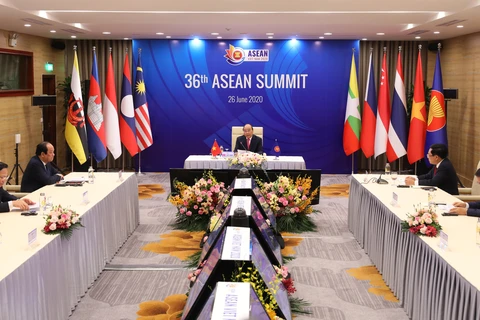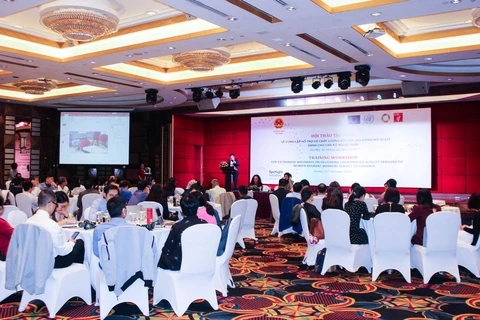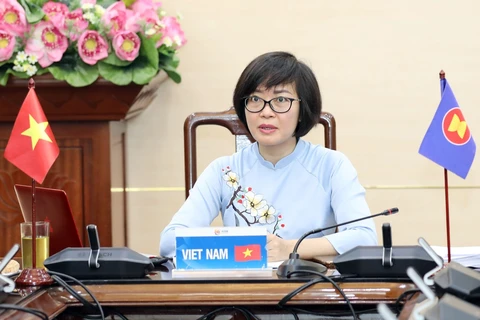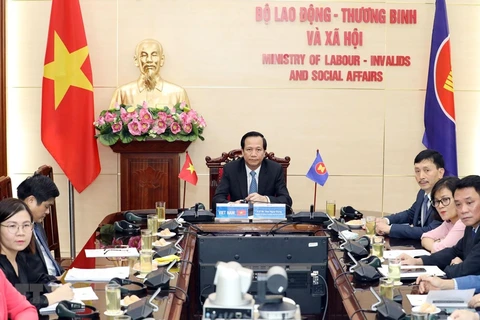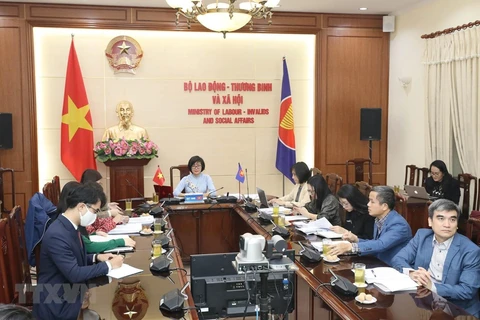Hanoi (VNA) – The Ministry of Labour, Invalids and Social Affairs (MoLISA) of Vietnam, which holds the Chairmanship of ASEAN 2020, in conjunction with the ASEAN Secretariat and the International Labour Organisation (ILO), organised the 13th ASEAN Forum on Migrant Labour (AFML) on November 10 in both video conference and in-person formats.
The ASEAN Forum on Migrant Labour is an annual event hosted by the nation holding the Chairmanship of ASEAN as part of activities of the ASEAN Committee on the Implementation of the ASEAN Declaration on the Protection and Promotion of the Rights of Migrant Workers (ACMW).
Participants in the forum include government officials and representatives from organisations of employers and employers as well as social and international organisations. It is an important forum, offering an opportunity for participants to discuss issues and viewpoints on migrant labour and put forth recommendations.
Recommendations and solutions to promote the rights of migrant workers proposed at the forum will create a foundation for the building and implementation of regional and national activities to provide better and timelier support for migrant labourers. Through 12 editions since its inception in 2008, the forum has collected 162 regional recommendations and ASEAN member nations have annually reviewed the implementation of these proposals at the national level.
The 13th ASEAN Forum on Migrant Labour was held with the theme “Supporting Migrant Workers during the Pandemic for a Cohesive and Responsive ASEAN Community.”
In his opening remarks, Vietnamese Deputy Minister of Labour, Invalids and Social Affairs Nguyen Ba Hoan said, amid the context of integration and globalization, migrant workers have become an indispensable part of economies. Migrant workers have contributed remarkably to the economic growth and sustainable development of both sending and receiving nations, he said.
Having been aware of the role of migrant workers, ASEAN member states have always paid attention to the protection of the legitimate rights and interests of migrant workers and their families, Hoan noted.
The rapid spreading of the COVID-19 pandemic has imposed serious impacts on economies, businesses and labourers in the world and the region as well. The regional governments and international organisations have taken measures to minimise the pandemic’s impacts on labourers in general and migrant workers in particular such as providing free COVID-19 testing and health care for migrant workers, automatic visa extension and temporary incomes for returnees.
At the 13th ASEAN Forum on Migrant Labour, delegates reviewed the implementation of recommendations put forth at the previous events and shared information about the theme of this year’s forum via two main topics.
The first topic mentioned COVID-19’s impacts on migrant workers and how ASEAN copes with the pandemic. This topic focused on health risks facing migrant workers and their possibility to get access to health care, information, rights to work, justice, social security and relief aid.
The second topic talked about policies on migrant workers to prepare for the future of ASEAN. Delegates analysed lessons of experience drawn from the COVID-19 pandemic in order to enhance management of migrant workers so as to improve resilience in future crises, disasters and pandemics.
Participants emphasized the need to build housing, provide salary, expand social relief aid and social security for migrant workers, devise preparedness plans to cope with emergencies and pandemics.
Based on discussions at the forum as well as national proposals, delegates debated and agreed upon regional recommendations of the 13th ASEAN Forum on Migrant Labour to increase assistance to regional migrant workers and help them proactively respond to impacts of the COVID-19 pandemic as well as other epidemics in the future./.


